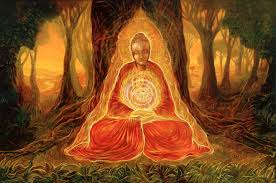
“We are all living within a myth, the myth or myths that provide us with our fundamental world view. Psychotherapists [often read] the Buddhist myth in terms of their psychotherapeutic myth…But to understand Buddhism, one must enter the Buddhist myth, and once we are within that myth, then we will naturally read psychotherapy in terms of Buddhism”… Patrick Kearney
As my dharma practice has unfolded during dedicated study over more than 40 years, it has taken shape as a psychologically-minded contemplative practice that I call “Inquiring Deeply”. Simply stated, I have made it a habit to inquire within about the “deeper meanings” I see in whatever events are transpiring in the moment. My inquiry lives in the overarching frame of Buddhadharma. It begins with the premise, as Pema Chodron famously said, that “this very moment is the perfect teacher”.
Starting with the intention to explore the leading edge of subjective experience, “Inquiring Deeply” is awareness practice which is focused on deepening understanding of your emotional life. Deep emotional understanding is more than simply mindfulness. It is intuitive understanding grounded in personal history, embodied experience, and the felt sense of things. The emphasis in deep inquiry is on exploring the field of relational connection with others.
The most frequent question that I get asked is how (and whether or not) Inquiring Deeply differs in any significant way from the dharma practice I have learned in the American Vipassana movement (as taught by Joseph Goldstein, Jack Kornfield, and many others). I found that question sufficiently interesting that I wrote a book about it (“Mindfulness-Informed Relational Psychotherapy and Psychoanalysis: Inquiring Deeply”; Routledge Press, 2017).
Are Buddhism and psychotherapy different? Zen-like, in my book I conclude BOTH yes and no; NEITHER yes nor no. Your answer depends upon where you are looking from. As the opening quote suggests, both Buddhism and psychotherapy are narratives (“myths”). The distinction between them is neither clearly delineated nor fixed.
That said, my effort has been to construct a wise and compassionate frame that includes them both.